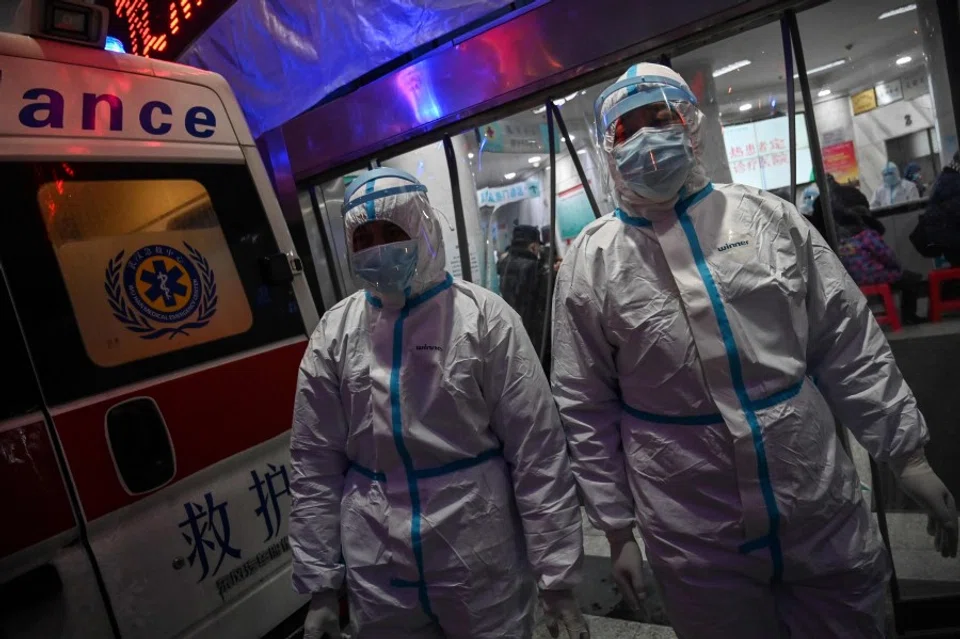The politics behind the change of leaders in Hubei
Amid growing resentment against the leaders of Wuhan and Hubei, Chen Yixin, secretary-general of the Central Political and Legal Affairs Commission, has taken charge of efforts against the epidemic in Hubei. Zaobao correspondent Yu Zeyuan looks at the difficulties of changing provincial-level officials in China and the likelihood of personnel changes improving the situation.

With the Covid-19 (formerly known as 2019-nCoV) epidemic showing no signs of abating, as well as growing resentment and calls for accountability, personnel changes in the Hubei province show that China's leaders are trying to change the thus far passive approach of combating the virus in Hubei, and especially in Wuhan city.
Following the appointment of Chen Yixin, secretary-general of the Central Political and Legal Affairs Commission, as deputy head of the central government's directing group on Hubei in charge of dealing with the epidemic in the province, Hubei Health Commission's Communist Party boss Zhang Jin and director Liu Yingzi were both removed yesterday. Their roles will be filled by Wang Hesheng, a member of the provincial committee of the Communist Party.
But in China, changing provincial-level officials is no easy task; a balance of various powers and job requirements have to be considered.
Two days ago, while reviewing efforts against Covid-19 in Beijing, party secretary-general Xi Jinping said the epidemic remains serious and all-out efforts are in force. He added that Hubei and Wuhan are the top priorities and the deciding battleground against the epidemic: "Win in Wuhan, win in Hubei; win in Hubei, win in China."

As Wuhan and Hubei failed to immediately control the epidemic, leading to it spreading through China, ground sentiment shows a lack of trust and confidence in the Wuhan and Hubei leadership. Anxiety is even higher in Wuhan, where the epidemic is at its worst. Agencies have not been effective, showing that a change in personnel is needed to lead efforts against the epidemic and stabilise the situation.
But in China, changing provincial-level officials is no easy task; a balance of various powers and job requirements have to be considered. Especially in Hubei, at the forefront of the fight against the epidemic, two difficulties lie in changing the main party politicians in charge.
... if the change does not work well, it will delay the fight against the epidemic, while the one who recommended the new person will also be under pressure.
First, who to send. Changes in provincial-level officials have to be discussed by the Politburo of the Communist Party of China, and are usually the result of jostling among leaders of various camps, rather than the decision of one person.
Second, whether the new person can hit the ground running and change the current difficult and dangerous situation in Hubei. Given Hubei's wartime-like conditions, if the change does not work well, it will delay the fight against the epidemic, while the one who recommended the new person will also be under pressure.
Current leaders of Wuhan and Hubei looking to "redeem themselves"
So, despite the wave of intense sentiment, for now, China's top leaders can only allow the current party leaders of Wuhan and Hubei to continue in office to "redeem themselves", with Chen Yixin taking over in Wuhan and Wang Hesheng coordinating efforts in other areas in Hubei.
Between the two, Chen holds a higher position and a more important role. He was previously deputy secretary-general of the Zhejiang Party Committee, assisting then Zhejiang party secretary Xi Jinping. He was also the former party secretary of Wuhan, and is familiar with Wuhan's party cadres. Now, returning to Wuhan as a provincial-level official to oversee efforts against the epidemic, he will be able to give direct instructions to Wuhan's officials.

The Central Political and Legal Affairs Commission revealed on its WeChat account that Chen arrived in Wuhan on 8 February, and immediately got an idea of the situation, working until one or two in the morning over the past couple of days.
"Yixin is back!" - Weibo
Chen has called for three measures to be implemented immediately in Wuhan.
First, all districts in the city, right down to the streets in each area, have to file hourly progress reports with the directing office in Hubei.
Second, city-level cadres have to visit the districts, while district-level cadres have to go down to the streets, and directly manage the state of affairs.
Third, there will be a system of accountability, where results count and those who do not complete deliverables will be sternly dealt with.
Positive response to Chen
The response to Chen's being parachuted into the front line in Wuhan has been positive. Two days ago, "Yixin is back!" was a hot search topic on Weibo.
The 61-year-old Chen is considered a rising political star. He was previously promoted in March 2018 from Wuhan party secretary and Hubei deputy party secretary to secretary-general of the Central Political and Legal Affairs Commission. Over the past two years, Chen has led national anti-vice efforts, including the case of Deng Shiping, whose body was buried in a playground in Xinhuang (新晃), Hunan.



![[Photos] Fact versus fiction: The portrayal of WWII anti-Japanese martyrs in Taiwan](https://cassette.sphdigital.com.sg/image/thinkchina/3494f8bd481870f7c65b881fd21a3fd733f573f23232376e39c532a2c7593cbc)

